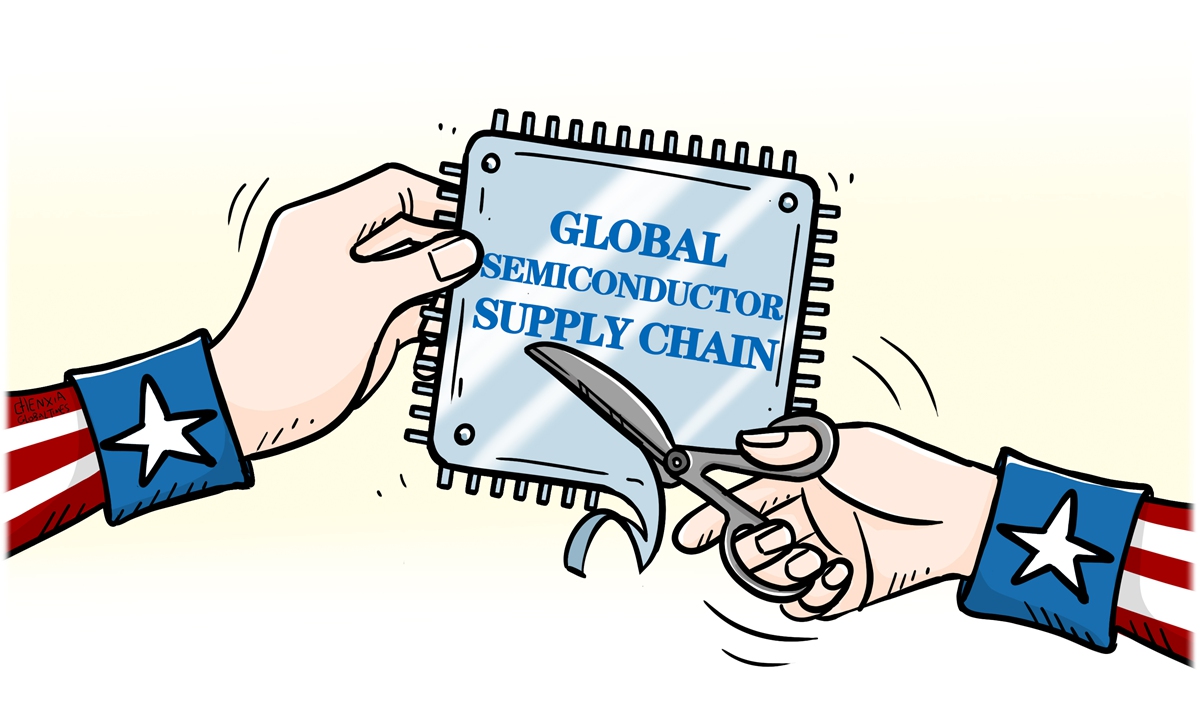
Illustration: Chen Xia/GT
The US government has been touting a so-called Chips Alliance proposal to chip manufacturing powerhouses in the Asia-Pacific region - South Korea, Japan and the island of Taiwan - in an apparent attempt to kick the Chinese mainland out of the global chip supply chain. But South Korean government and chip manufacturers may find the scheme hard to accept, South Korean news outlets reported on Monday.
Washington's latest political coercion will burden South Korean semiconductor companies such as Samsung Electronics Co and SK Hynix Inc, because they have significant business operations in the Chinese mainland. As it is impossible to separate the supply chain and various trade and tariff issues, the South Korean government may be put in a tough situation if the US forces it to take sides, reports said.
The US has long attempted to corral Japan, South Korea and the island of Taiwan with various attempts to build a US-led semiconductor supply chain alliance excluding the Chinese mainland. Yet, South Korea's concerns show that a harder push from the US on the "Chips Alliance" scheme will likely encounter significant pushback. Rather than cementing US semiconductor dominance, such moves could further exacerbate the global chip shortage, which will eventually bite back on US companies.
An increasing gallery of evidence is pointing to the US' political disruption that was designed to stifle China's chip sector is one of the major causes of the global chip shortage that could be traced back to the first half of 2020 and has rattled a slew of industries.
Against the backdrop of tight chip production capacity and soaring demand amid the COVID-19 pandemic, former US President Donald Trump's arbitrary sanctions on major Chinese tech giants like Huawei and Semiconductor Manufacturing International Corp (SMIC) have dealt at least two heavy blows to the global chip industry chain, according to some reports.
An auto component maker admitted that after it was banned to deal with SMIC amid Trump administration's last frenzy against Chinese companies, the Taiwan Semiconductor Manufacturing Company (TSMC) couldn't at once fill the demand gap SMIC left, said an RFI report.
The US' chip hegemony has endangered the global chip industrial chain, prompting criticism from companies from all over the world. Since the Trump era, the US government has tried all possible means to obstruct chip makers to import Dutch company ASML's EUV lithography equipment - a complicated machine that US policymakers view as a key lever to strangle China's progress in the semiconductor sector. The US' relentless political interference has overwhelmed global businesses.
Last November, US President Joe Biden's administration obstructed SK Hynix's plan to import the advanced equipment to its chip factory in East China's Jiangsu Province, according to Reuters. In response to the US' arbitrary ban, ASML CEO Peter Wennink said export controls against China will not only fail to halt its technological progress but also hurt the US economy. But Biden has apparently chosen to tone deaf to such warnings.
While US politicians are busy concocting its CHIPS Act and splitting the global semiconductor sector to stifle China's chip development, it apparently didn't pay much attention to the collateral damage forced upon its own economy. Because chips are one of the core components of almost every consumer goods from mobile phones to cars, the impact of chip supply shortages on the US economy is comprehensive and huge.
Data shows that the global chip supply crisis' impacts on the US auto industry have led to skyrocketing vehicle prices - which in turn drove one-third of all of the painful inflation Americans saw in 2021, according to a US media report.
In a recent letter to US Secretary of Commerce Gina Raimondo, the US Chamber of Commerce said the semiconductor industry is global in nature and reliant on open markets and supply chains that span the world. In this inseparable global chip industry chain, China is obviously playing an increasingly important role. While the US' share of global semiconductor manufacturing capacity has declined from 37 percent in 1990 to 12 percent in 2020, the Chinese mainland's chip production capacity has reached 15 percent of the global capacity, surpassing the US and ranking the third.
Given Asian economies' complementary strengths when it comes to semiconductors, the US' attempt to exclude the Chinese mainland from the global chip supply chain is unrealistic and counterproductive. If the Biden administration continues to recklessly impose the "Chips Alliance" proposal on regional economies, it will encounter backfire from economic laws and severer economic impacts from a worse chip supply shortage.
The author is a reporter with the Global Times. bizopinion@globaltimes.com.cn




